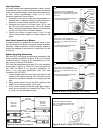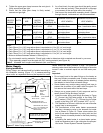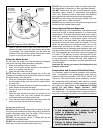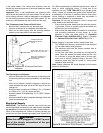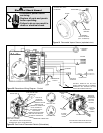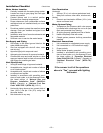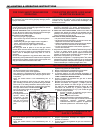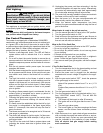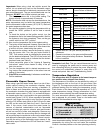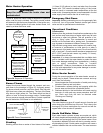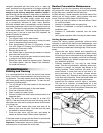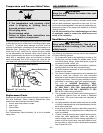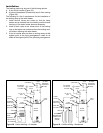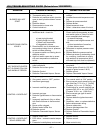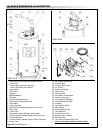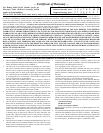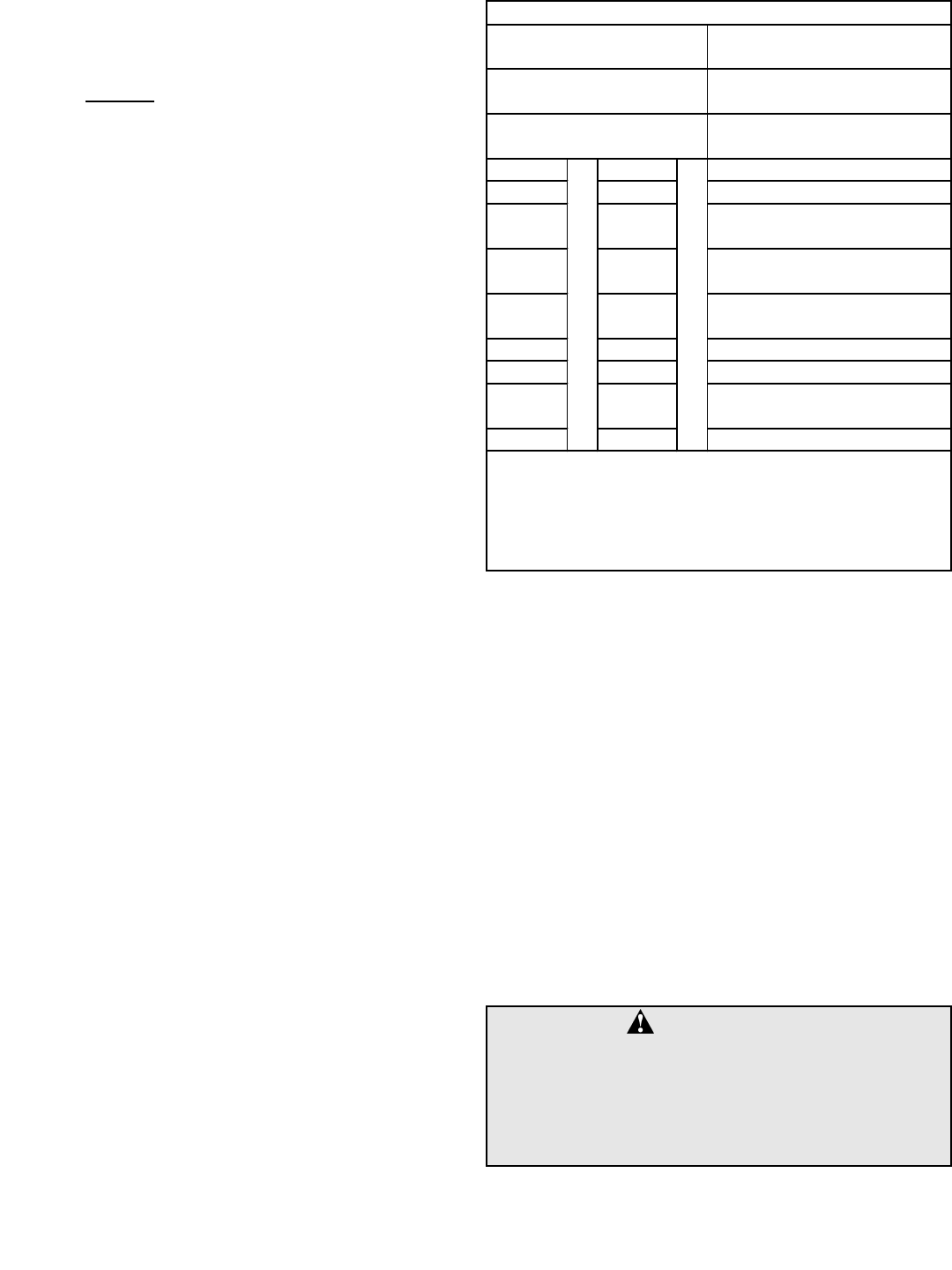
Important: When using a leak test solution around the
control, do not splash any liquid on the flammable vapour
sensor, electric connections or electronic components of the
gas control/thermostat. The gas control/thermostat can be
damaged. DO NOT
use a flame to detect gas leaks.
7. Turn the temperature dial to the lowest setting. The
burner will stop in approximately 20 seconds.
NOTE: If the burner does not stop as described above, the
water temperature may be below the lowest temperature
that the thermostat is able to sense ((32°C) 90°F). Wait until
the water temperature has risen.
8. Re-cycle the system by turning the temperature dial up
toward the “HIGH” position to call for heat a second
time.
9. To check the lockout on the ignition control, turn the
temperature dial to the lowest setting possible. Wait for
the system to shut down completely. Then, set the gas
control switch to the “OFF” position.
10. Now turn the temperature dial to the highest setting.
11. The igniter will be energized. However, since there is no
main gas flow, the burner cannot be lit. After three trials,
a lockout will occur, deactivating the system.
12. To reactivate the system, remove the power by unplug-
ging the power cord. Turn the gas control switch to
“ON”. Then restore power by reinserting the power cord
into the electrical receptacle. The LED on the control will
flash a system status code to indicate that the lockout
has been reset (see Table 3).
13. Follow instructions given in the “Lighting & Operating
Instructions” section when heater is ready to be put
back into service.
14. Turn the temperature dial to desired temperature set-
ting. Instruct the owner/operator in the correct use and
setting of the control.
15. If the LED is on continuously, it indicates a control failure.
Call for assistance.
Flammable Vapour Sensor
When using a gas fired water heater there is a risk of flam-
mable vapours entering the combustion chamber, being
ignited by the burner flame and causing a flashback. In
order to detect such flammable vapours before they enter
the combustion chamber, this water heater is equipped with
a flammable vapour sensor (FVS). It is a chemical-absorp-
tion based sensor that is connected to the gas control/ther-
mostat (see Figures 21 & 22). When exposed to flammable
vapours it will trigger the control to stop the flow of gas and
enter the FVS lockout state. While in the FVS lock-out state
the LED on the control will flash the 2-and-1 Gas lock-out
code. If this occurs, check around the water heater for
sources of chemical contamination such as: flammable
vapours including gas vapours, solvents, paint and thinners
as well as sources of water and detergents. Remove any
such sources, check the surrounding area for damage and
call a qualified service technician to service the water heater
and replace the flammable vapour sensor. If there is a prob-
lem with the wiring of the flammable vapour sensor or the
flammable vapour interface the LED will flash the 2-and-3
status code.
Resettable Lock Out: The gas control/thermostat can be
reset by unplugging the power cord to remove power and
then reinserting the plug to restore the power. Alternatively,
the control will automatically attempt to reset after a 20
minute wait period. Also see “Troubleshooting Guide”.
Temperature Regulation
The temperature dial is adjusted to its lowest tempera-
ture position when shipped from factory.
The temperature of the water can be selected by setting of
the temperature dial on the front of the gas control (see
Figure 23). The large arrow position on the thermostat is the
preferred starting point for setting the temperature control.
Each division on the thermostat dial represents a 3°C (5°F)
water temperature change. Energy conservation is a con-
sideration when selecting the water temperature setting.
For most economical operation, select a water temperature
that is adequate for your needs. There is a hot water scald
potential if the thermostat is set too high.
In households with children, disabled or the elderly, select a
lower temperature setting. Valves for reducing point–of–use
temperature by mixing hot and cold water are available.
Consult a licensed plumber or the local plumbing authority.
WARNING:
Risk of scalding
Hot water can produce third degree burns
in 6 seconds at . . . . . . . .60°C (140°F)
in 30 seconds at . . . . . . .54°C (130°F)
in 5 minutes at . . . . . . . . .49°C (120°F)
Control Failure or Miswiring.*
Water Heater is in Stand-by
Mode.
Water Heater is in Heat Mode.
1 flash 1 flash
Ignition Failure.**
2 flashes 1 flash
Flammable Vapour Detected.*
2 flashes 3 flashes
Flammable Vapour Sensor
Interface Failure or Miswiring.*
3 flashes 1 flash
Pressure Switch Fails to
Open.***
3 flashes 3 flashes
Pressure Switch Fails to Close
or Hi-Limit Switch is Open.***
4 flashes 1 flash
Line/Neutral Polarity Failure.***
4 flashes 2 flashes
ECO Failure.***
4 flashes 3 flashes
Flame is Present at the End of
Heat Cycle.***
5 flashes -
Vacation Mode.
Pause for 1 second
Pause for 3 seconds & repeat
Table 3 SYSTEM STATUS CODES
Steady ON
Slow Flash
Fast Flash
– 22 –
* System lock out. Call your service provider for
assistance.
** Excessive moisture on the gas control/thermostat.
*** System interruption/safety shutdown. Resettable
lock out condition.



